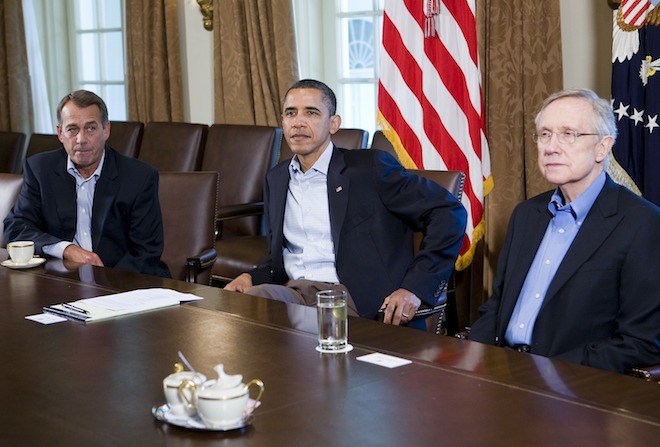With Congress set to return to town this week, staff-level bipartisan discussions are underway over how to pay for extensions of the payroll tax cut, unemployment insurance and the so-called Medicare “doc fix” beyond the end of February, when they’re set to expire. The private meetings are a continuation of the December showdown, which ended with two-month extensions of the three provisions and a guarantee that the House and Senate would negotiate a year-long measure.
But many of the factors that made the two month bill so contentious remain in place, and threaten a new brinkmanship at the very beginning of this session of Congress.
The political chemistry will be familiar to those who closely followed the highly reactive dynamics on Capitol Hill in 2011. Both parties agree that all three items need to be extended, and Democrats have accepted that they ought to be paid for. The question is how to fund them. And for some Republicans, it’s whether to extend them at all without demanding unrelated, partisan policy concessions from Democrats in return.
That dynamic threatens to drive a wedge between House GOP leaders, who would like to avoid another losing fight over the payroll tax cut, and the rank and file, many of whom remain wary of the policy and of handing President Obama another political victory.
Democrats have a mixed stake in the outcome. If the payroll tax cut and emergency benefits lapse, it would slow growth in 2012, just as the economy is showing some new vibrancy. But they’re on the right side of the politics of the fight, and believe voters would identify Republicans as the villains if the measures lapse.
That’s a huge problem for the GOP. Even if top Republicans can quell a rank-and-file revolt, and avoid a contentious fight over the merits of the extenders, they’ll still be in the pinch over how to pay for the $100 billion-plus package.
As with the ill-fated Super Committee, insiders expect decision-making to be passed upstairs to party leaders when the deadline approaches. That’s when the same divisions over budget matters that have defined the 112th Congress — what to cut, how much to cut, and whether tax revenues may be a part of the package — are all but certain to resurface.
Democrats, many of whom believe the GOP is attempting economic sabotage, are weary of kowtowing to GOP demands, and last month demonstrated their willingness to flex some legislative muscle.
That strategy paid off in the end. But it’s unclear whether House GOP lawmakers will dial back their demands this time — especially on the “doc fix,” which they’re very supportive of extending. Republicans have proposed to pay for their package with new Medicare fees and cuts to the health care reform law’s affordability credits — both of which have met stiff resistance from Democrats.
“House [GOP] Doc Caucus members are still very, very opposed to anything that is not a 2-year [doc] fix,” a GOP health care source told TPM. “However, per traditional conference rules, it’s hard to see what would be permitted to be ruled out of order in the Senate if Dems or GOP tried to introduce new issues/pay-fors.”
Private talks kicked off last Wednesday at a preliminary meeting between aides to Senate Finance Chairman Max Baucus (D-MT) and House Ways & Means Chairman Dave Camp (R-MI), hill sources told TPM. But even if the groundwork for the negotiations is laid smoothly, prepare for a roughness when those talks turn substantive.






